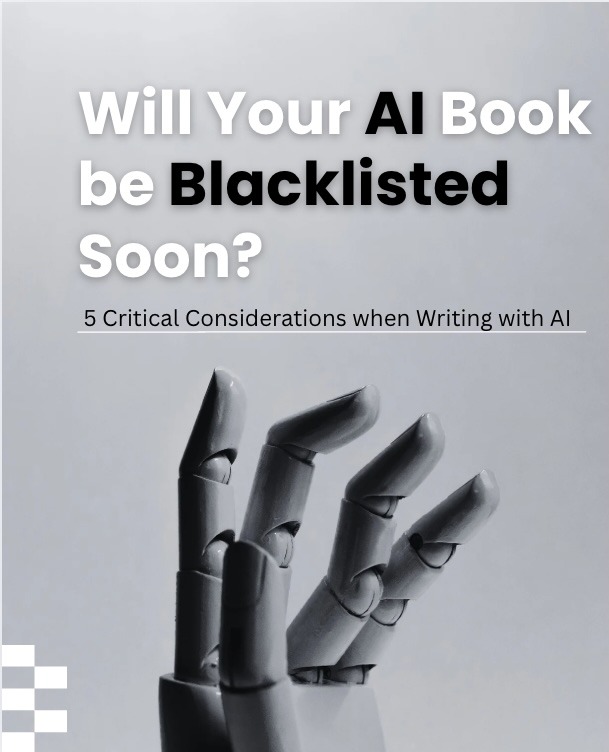
Will Your AI Book be Blacklisted Soon?
Read Write X
6/3/20255 min read


At Read Write X, we consider technical written works we create to be AI-collaborative and allow our clients to determine what percentage of AI "collaboration" they prefer. Every technical white paper, textbook or book begins with asking our clients a simple question:
"Would you like LLMs to be used in creating this product? If so, to what extent would you like LLMs utilized?"
In recent years, questions on the informed consent of clients of their service providers AI usage were unheard of. However, in today's landscape, these questions and their answers are crucial. Like everyday users of LLMs from Anthropic's Claude to Google's Gemini, when considering how and when to utilize LLMs or colloquially “Generative AI,” most people want to see what they can get. The average consumer’s mindset is typically show me the output, and if its good enough, sure I'll take it.
And as LLMs continue to become embedded into our everyday lives, determining where to properly position them professionally and creatively matters. At Read Write X we give our clients four options to select from:
An entirely human-generated product. Restrict AI to data collection, research & organization.
An entirely machine-generated product that is edited and fact-checked by humans.
X% to be human-generated and X% to be AI-generated, with humans performing the final editing and fact-checking.
Not sure, tell me which you think is best.
To help consult our clients to answer the above questions, one determining factor is what industry is this product being developed for and what restrictions/guidelines exist?
Story #1: Blacklisting LLMs in Academic Writing
Academia is laying the cultural/social foundations for LLMs. And as we continue to hear of more stories coming out of universities about student suspensions and expulsions due to “AI academic cheating/plagiarism,” it is clear that academia and academic writing dissuades the use of generative AI because of the issue of formulation of original intellectual thought. To put things into context, in sixth grade I was sent to the principal’s office for plagiarism because at that time, I didn’t know it was “wrong” to copy half of an essay I wrote for chorus from whatever I found on Google. So as a large portion of our writing services are focused on producing technical documentation, we see the academic standards spill over into professional standards.
As we recently closed out creating technical white papers for submissions to 2025 cyber security conferences/hackathons (e.g. DEF CON, Black Hat etc.). our foundational question of how much AI was discussed during the product design/development stage as we reviewed submission requirements. Black Hat USA, for example, submission requirements mandated that “submissions that include text generated entirely from LLM…are prohibited.” They went on to say that “submitters may use LLM tools for editing or polishing author-written text ONLY.”
Couple of questions that come to mind, what LLM detection tools are the committee using to screen submissions? If everything is simply math, and the LLMs improve exponentially, will LLM detection tools be able to keep up or will LLM-generated content become undetectable due to improvements in general Gen AI indicators (e.g. hallucinations, vagueness, redundancy etc.)?
Again its a #theoreticalthursday …so we consider these things in theory and in practice. In this example, ultimately we followed the academic guidelines provided and created human-generated/author-written white papers to satisfy Black Hat scientific/academic integrity mandates. Side note on this. Yes, we assume this mandate from the conference comes from the issue of plagiarism and citation mandates for academic white papers…and also that the review committee were possibly tired of reading unedited Gen AI papers that sounded drunk, schizophrenic or made no sense.
The Purpose and Positioning of Books in the Marketplace
Aside from shorter form academic writing like white papers, one written product that we believe will be at the forefront of the Gen AI debate are books. As a society, we all love books. We buy furniture called bookshelves to store them. We typically would never think to throw a book in the garbage, but rather donate them instead. Books are sacred. Yes, podcasts, short form videos, tweets and social media posts are great for content. But we believe that books will continue to be considered the authoritative and sophisticated intellectual/informational resource (whether consumed via reading or audiobook). Think about it like this, what’s your assumption of the credibility behind someone saying “in a book I read it said X….” versus “I heard this on a podcast once….”?
Yes both forms of content are effective. But one has proven its social staying power over thousands of years. People don't have home offices with a shrine of books because they want you to think they can cook. Its because they want you to think they are educated, cultured or intellectual. With that, as we actively help our clients with ghostwriting, editing and consulting on their technical textbooks to books on entrepreneurship, we are constantly considering the positioning of books in the marketplace.
Story #2: Considering the Future of Gen AI Books for Our Clients
As Read Write X utilizes LLMs in our writing process, we strongly encourage our clients to consider what this could mean in the future. One of our clients, for example, was open to using LLMs to generate content for a book to which we asked them:
“Are you accepting the risk of this future book possibly being down-ranked based on the percentage of Gen AI utilized?”
Our client’s response: “I never thought about that.” As a writing company, we are responsible for considering the possibilities behind all the AI hype and promises. Yes, you can generate a book faster. Yes it is easier. And yes, we will write you meticulously customized prompts to ensure the input will generate a high-quality output (we won’t get into localized versus internet-based at this point in time and impact of memory on output). We know we can generate a great product that is 100% Gen AI, and with that we must consider market trends. And who will set the rules in the marketplace for Gen AI books? We believe the consumer.
The consumer will dictate 'Gen AI' market trends.
If you are like us, you use Amazon Kindle Direct Publishing (KDP) to market and sell your books. If you log into Amazon KDP today and attempt to publish a new book to sell, you will see the following section on “AI-Generated Content.”
As Amazon holds a significant share of the online book market, their belief in being customer obsessed means that the consumer will shape/dictate Amazon KDP’s AI-generated content guidelines. Looking at the above image on “AI-Generated Content,” we encourage collective consideration of the following:
Copyright, trademark and intellectual property (IP) laws will play a major role in Gen AI book blacklisting…or whitelisting. I won’t get into a debate on copyright law and training LLMs. Our opinion may be put metaphorically. If I steal my neighbors butter and sugar from their kitchen, take it to my house and bake a cake, and bring that cake to the county fair to share with everyone…I’m probably not the best neighbor. But everyone loved the cake!
If consumers become fatigued from lack of originality of content, they will demand authenticity through their rejection of Gen AI books.
If consumers are angry that they are paying for something that the author essentially data scraped from others or “plagiarized,” they will demand distinctions in AI-detectors/labeling products to ensure the price reflects this.
If a AI-generated content is trained solely on the author’s work, writing, style etc. via a small language model (SLM) for example, then is the work no longer considered plagiarism?
If the next generation of consumers is currently using Gen AI in their schoolwork and everyday lives, this may move the needle in favor of AI-generated books.
In closing, we believe that the question of blacklisting or down-ranking Gen AI books is not only a technical or legal question, but a philosophical one.
We believe that the question of Gen AI books is not only a technical or legal question, but a philosophical one.
As humans let’s consider these possibilities, critically think and come to our own conclusions in order to create a human-centered future with AI.
